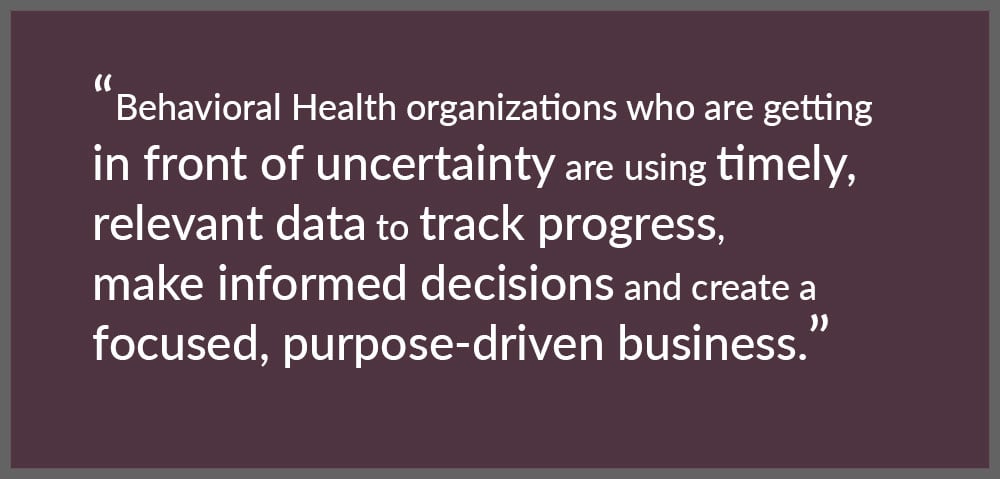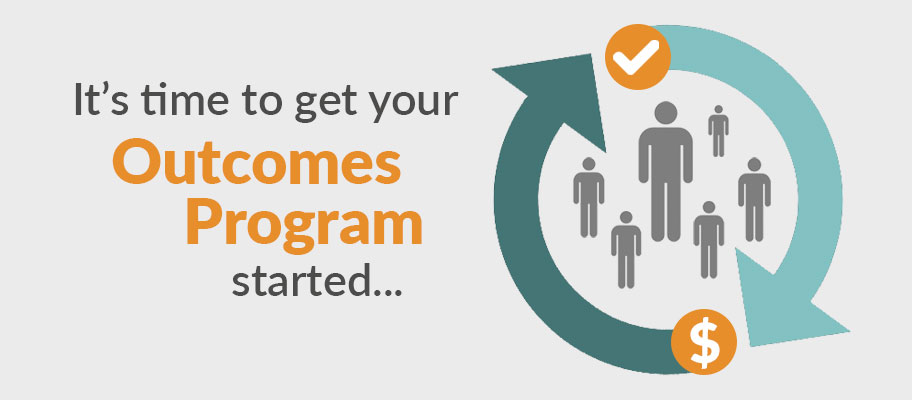A new decade has finally dawned, and behavioral health continues to advance. We’ve collected a variety of topics we believe will define the behavioral health landscape in 2020, with sources examining each one. Throughout 2020, we plan to expound on each of these topics ourselves, adding our expert opinions to the larger discussion. For now, consider this an introduction to what to expect in the coming year.
Do You Know Your Numbers?
If not, you may not survive 2020.
They say, "hindsight is 2020", but with so much at stake in the addiction treatment field today foresight is no longer a luxury - it's a necessity. Are you prepared to have 2020 Foresight in 2020?
2019 has been a big year of change in the industry, and it’s just the beginning. Most addiction treatment businesses have lived with uncertainty and done their best to navigate their way through new payer rules and reimbursement trends. As we move into 2020, Avea is committed to continue bringing knowledge and information to the industry to help you stay ahead of the confusion and position you for growth.
What Gets Measured, Gets Managed
You may have heard us say this before. Behavioral Health organizations who are getting in front of the uncertainty are using timely, relevant data to track progress, make informed decisions and create a focused, purpose-driven business. Do you know what data you should be tracking, and what it’s telling you?
If not, you are not alone. So throughout the remainder of the year, Avea will be reviewing some key metrics that are important for Behavioral Health businesses to understand and monitor, and outline best practices for how to make improvements when needed.
Let’s Start With Your A/R... It's More Than Just A Report
Many are familiar with the traditional A/R report because it’s an indicator of your cash flow velocity – how quickly you get paid after billing. Unfortunately, most people don’t really know how to use an A/R report to manage their business. While it does tell you how fast your payers are paying you, it will also tell you how good of a job your staff is doing at managing processes that directly affect your billing and collection processes, and thus your cash flow.
A good billing system will allow you to drill down into your A/R and analyze it by the various issues that are holding up payment. This is a critical analysis because it will not only identify what the issues are, but will let you know how much of your revenue is at stake – Are your payers asking for medical records? Are your admissions causing problems? Is incorrect credentialing causing issues? Drilling into and analyzing your issues will point to where you might have breakdowns in your processes and should focus your efforts and get to root causes.
Download our Tipsheet:
Measuring and Managing Days A/R
We’ve created a tip sheet to explain in greater detail what to know about your A/R and outlined some best practices for managing it. We encourage you to download it to learn more.
By Joanna Conti
CEO, Vista Research Group, Inc.
In this time of tremendous industry upheaval, your ability to convince key payers of the unique value your addiction treatment center provides is crucial to your ability to stay in business.
Addiction Treatment Reimbursement Rates: Part 2
In our prior post on negotiating reimbursement rates, we interviewed PANLR founder and President Kevin Isaacs about how to negotiate more effectively with payers for higher reimbursement rates in 2020. In this article, we continue our interview.
Are you thinking about your reimbursement rates for addiction treatment in 2020? If not, you should be.
During the summer lull, many providers turn their attention to back-office improvement initiatives, and unfortunately, most of us in the addiction treatment industry have felt the pressure of declining reimbursement rates over the past 18 months. Now, more than ever it is crucial to understand how to negotiate more effectively with payers for higher reimbursement rates if facilities want to survive the revenue revolution upon us. For most, this is unchartered territory with little knowledge of where to begin. To help bridge this gap, we interviewed Kevin Isaacs, founder and President at PANLR - a leading provider of outsourced payer contracting services.
The addiction treatment industry is on the precipice of enormous change. Ongoing lawsuits—brought on by unethical behavior and business practices—will affect the way insurance providers reimburse addiction treatment facilities going forward. The challenge has been sounded: treatment providers must reevaluate and improve their manner of conduct if they wish to succeed under increased scrutiny.
Avea Solutions is a proud recipient of The Portland Business Journal Small Business Innovation Award. The award was created to honor Portland’s most impressive and innovative companies with fewer than 100 employees that provide a compelling and innovative product or service. Winners were announced and honored at a private banquet hosted by the Portland Business Journal on April 23.
What are behavioral health carve-outs and how does it affect you?
Behavioral health and physical health traditionally have been treated differently by U.S. payers and providers. As a result, behavioral health services may face different billing situations, such as behavioral health carve-outs.
Every day in the United States, over 130 people die of an opioid overdose. Prescription drug abuse and addiction has become a severe national crisis with devastating consequences that not only affect public health, but social and economic welfare as well. Politicians and healthcare professionals are striving to spread awareness and have put various initiatives in place to tackle the crisis. The healthcare industry has implemented a number of recovery methods for substance abuse treatment and continues to search for innovative ways to tackle the nationwide epidemic.
In 2019 and beyond, treatment centers of excellence must do everything they can to ensure patients are receiving the care they need, while also verifying that it can be obtained properly and legally. And the best way to do that if the appropriate units of care are being denied? By appealing.













